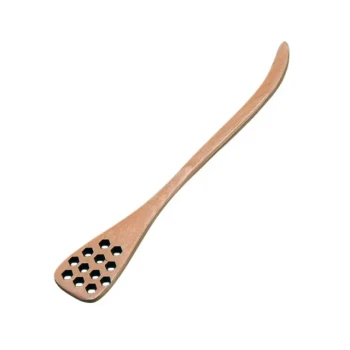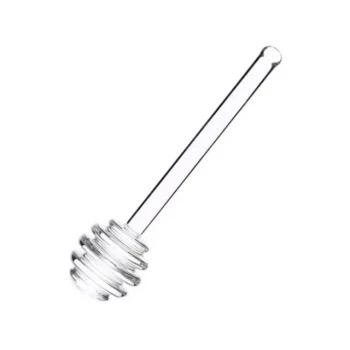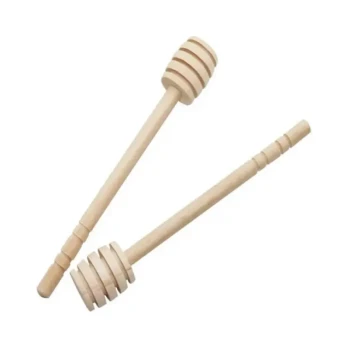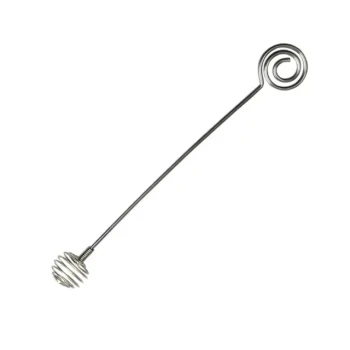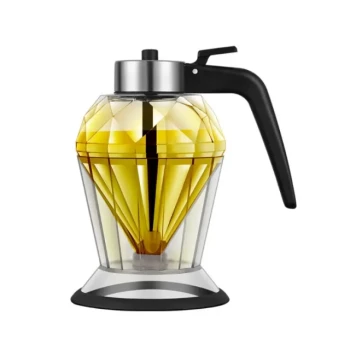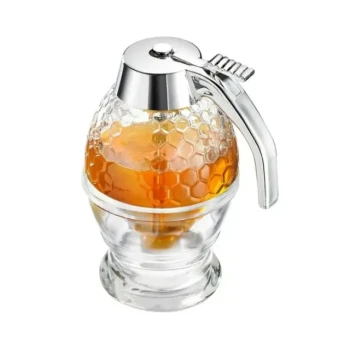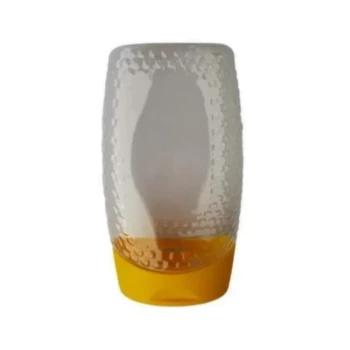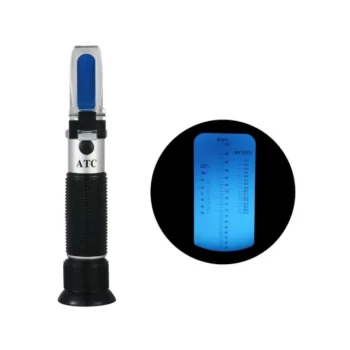At its core, you should not use soap to clean a honey dipper because it will ruin the taste of your honey. Even after rinsing, soap leaves behind a chemical and fragrance residue that contaminates honey's delicate and complex flavor profile. The proper method involves a simple rinse with warm water, which is sufficient for hygiene and preserves the integrity of the honey.
The central issue is flavor contamination, not hygiene. Honey is naturally antimicrobial, making aggressive cleaning with soap both unnecessary and detrimental to the tasting experience. Your goal is to preserve the honey's natural character, which soap fundamentally alters.
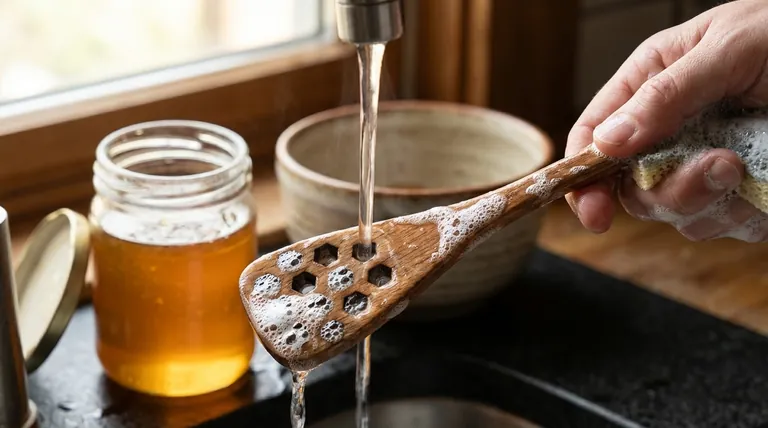
The Core Problem: Flavor Contamination
To understand why soap is the wrong tool for the job, you must appreciate the interaction between the soap, the dipper's material, and the honey itself.
Why Soap Leaves a Residue
Soaps and detergents are designed to bind with oils and be washed away by water. However, their chemical compounds, especially fragrances and surfactants, can cling tenaciously to surfaces. Even a microscopic layer of residue is enough to impart a bitter, "soapy" taste.
The Porous Nature of Wood
This problem is magnified with traditional wooden honey dippers. Wood is a porous material, meaning it has microscopic holes that will absorb liquids. When you wash a wooden dipper with soap, these pores trap the soap's chemicals, making it virtually impossible to rinse them out completely.
On the next use, this trapped soap residue will leach out of the wood and directly into your honey, altering its taste.
Honey's Delicate Flavor Profile
Honey is not a simple sweetener; it is a complex natural product with hundreds of aromatic compounds that create its unique flavor, which varies based on the nectar source. These delicate notes are easily overwhelmed by foreign chemicals, and the powerful agents in dish soap will invariably corrupt the pure taste you expect.
Understanding the Trade-offs: Hygiene vs. Preservation
A common concern is whether a simple water rinse is hygienic enough. This fear is based on a misunderstanding of honey's unique properties.
Is Rinsing Alone Hygienic?
Yes. Honey is a naturally antimicrobial substance. Its high sugar concentration creates a low water activity, which dehydrates and kills microbes. Furthermore, honey is naturally acidic, creating an environment where bacteria and other microorganisms cannot thrive.
A thin film of pure honey left on a dipper after use poses no significant hygiene risk. A thorough rinse with warm water is more than sufficient to remove the bulk of the honey and keep the dipper clean for its next use.
The Goal is Preservation, Not Sterilization
When cleaning a honey dipper, the objective is not to create a sterile, surgical-grade instrument. The objective is to preserve the integrity of the food product. Using harsh detergents introduces a contaminant that defeats the entire purpose of enjoying pure, natural honey.
The Correct Cleaning Method
Properly caring for a honey dipper is remarkably simple and requires only two steps.
Step 1: Rinse with Warm Water
Immediately after use, rinse the honey dipper under warm running water. The warmth will help dissolve the thick honey, allowing it to wash away easily without any scrubbing or soaps.
Step 2: Air Dry Completely
After rinsing, stand the dipper upright in a utensil holder or place it on a drying rack. Allow it to air dry completely before its next use. This is especially critical for wooden dippers, as it prevents the wood from staying damp, which could lead to cracking or mildew over time.
Making the Right Choice for Your Dipper
Ultimately, your cleaning method should align with the goal of preserving your honey's pure taste.
- If you are using a wooden honey dipper: Never use soap, as the porous wood will absorb it and permanently contaminate your honey's flavor.
- If your primary concern is preserving honey's taste: Stick to the warm water rinse method, as it is the only way to guarantee no foreign flavors are introduced.
- If you are using a non-porous dipper (e.g., stainless steel, silicone): While you could technically use soap with extremely thorough rinsing, the safest and simplest practice is to avoid it entirely to eliminate any risk of residue.
By choosing the right cleaning method, you ensure that every spoonful of honey tastes exactly as nature intended.
Summary Table:
| Aspect | Using Soap | Correct Method (Warm Water Rinse) |
|---|---|---|
| Impact on Flavor | Leaves residue, contaminates honey | Preserves honey's pure, natural taste |
| Hygiene Effectiveness | Unnecessary; honey is naturally antimicrobial | Sufficient; removes honey without contaminants |
| Best for Material | Damages porous materials like wood | Safe for all materials (wood, stainless steel, silicone) |
| Ease of Use | Requires thorough rinsing, risk remains | Simple, quick, and risk-free |
Ready to enjoy pure, untainted honey? Proper beekeeping starts with the right tools and knowledge. At HONESTBEE, we supply high-quality beekeeping supplies and equipment to commercial apiaries and distributors. Ensure the integrity of your honey from hive to table with our professional-grade tools. Contact our experts today to discuss your wholesale needs and elevate your beekeeping operation.
Visual Guide
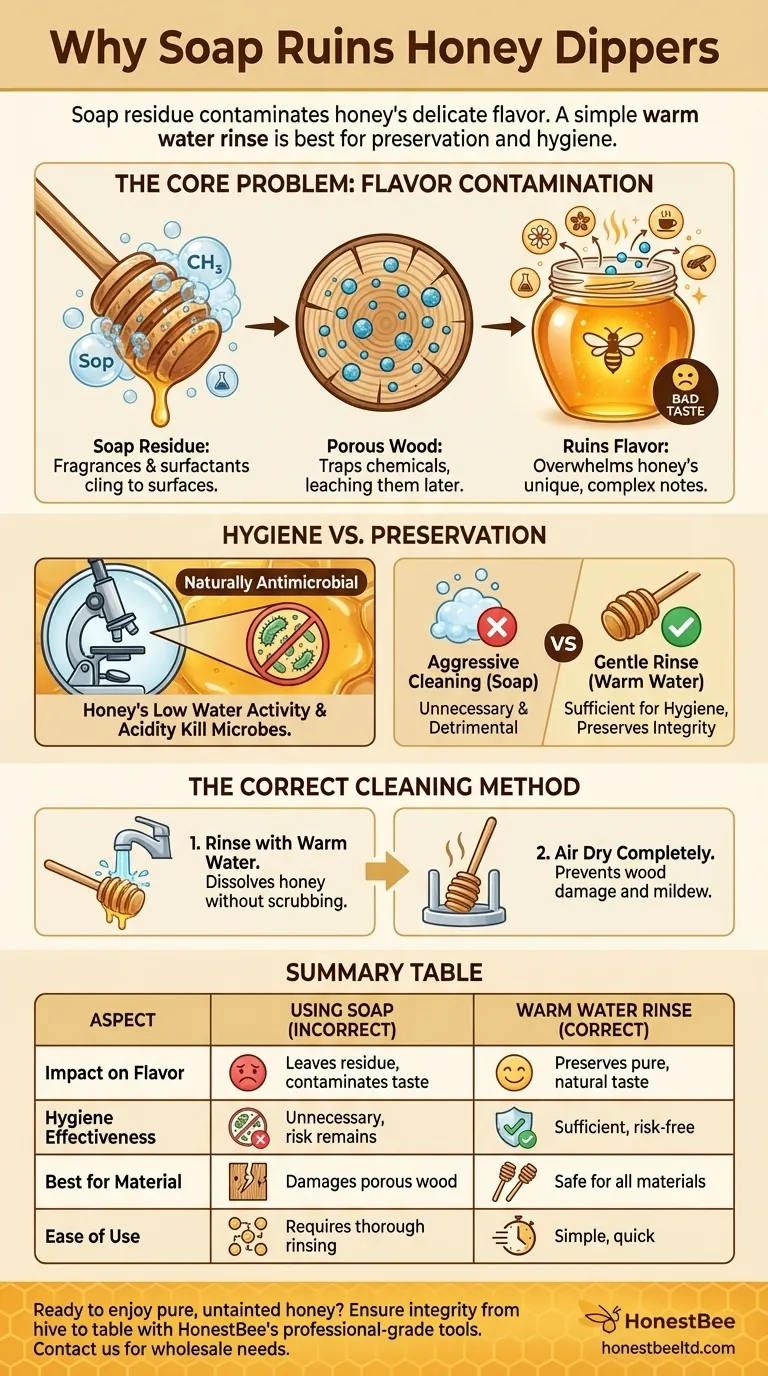
Related Products
- Modern Honeycomb Pattern Wooden Honey Dipper for Stirring and Drizzling
- Premium Heat-Resistant Glass Honey Dipper
- Natural Wood Honey Dipper for Tea Coffee and Desserts
- Modern Stainless Steel Honey Dipper Stirrer
- Premium Diamond-Faceted Glass Honey Dispenser
People Also Ask
- What are honey stick packs and honey straws, and how are they used? The Ultimate Guide to On-the-Go Sweetening
- What is a honeycomb dipper? Elevate Your Culinary Presentation with the Ultimate Texture-Enhancing Tool
- What is a honey taking spoon called? Discover the Tool for a Perfect, Mess-Free Drizzle
- How do you clean and store a honey dipper? Simple Steps for Long-Lasting Performance
- Why is a honey dipper considered more efficient than a spoon? Master the Art of the Perfect Drizzle
- What are the advantages of using a honey dipper over a spoon? Achieve Perfect, Mess-Free Drizzling
- What is the purpose of a honey bowl and dipper setup? Achieve Mess-Free, Elegant Honey Dispensing
- What are some ways to use a honey dipper? Master Mess-Free Drizzling for Drinks and Dishes
